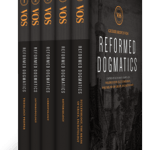
Recent years have seen a renewed interest in the relationship between eternity and time among philosophers, scientists, and theologians.?Theologically, this question gets at the age-old problem of how an eternal God can interact with a temporal creation. A new generation of theologians is not content with the traditional answers proffered through the centuries. An eternal God who is wholly removed from our present experience and affliction, the thinking goes, is not a God we can trust. Karl Barth has been increasingly tapped as a resource for exploring this subject.
Barth?s Christology is neither metaphysical nor merely heuristic; rather, it must be understood as an act?an event. The event of Jesus Christ in God?s life is the only solution to the problem of time and eternity in every locus of theology?whether the doctrine of God, creation, reconciliation, or revelation. Jesus Christ is himself God, creation, reconciliation, and revelation. He is no abstract God but is both the electing, eternal God and the elected, temporal man in one divine act of rapprochement. Further, he is no abstract creature but is both the eternal Creator and the temporal creature in one divine act of rapprochement. Similarly, Jesus Christ is no abstract redeemer but is both the eternal redeemer and the time-bound man of sinful flesh in one divine act of rapprochement.?Finally, for Barth there is no abstract notion of revelation but Jesus Christ is both the eternal revealer and the temporal receiver of revelation in one divine act of rapprochement.?God, creation, reconciliation, and revelation are the eternal act of God in Jesus Christ, in whom and by whom time is eternity and eternity is time?precisely because and insofar as he has become time.
This actualistic and temporal way of relating eternity and time is as monumental as it is revolutionary. In an attempt to bridge the infinite gap between eternity and time, Barth brings God and creation together in a third time-sphere?his theology is three-dimensional.?He affirms the theological existence of three times: God?s time, our time, and the time of Jesus Christ. This last time is what Barth refers to as Gottes Zeit f?r uns?God?s time for us (Die kirchliche Dogmatik I/2, 50).?Gottes Zeit f?r uns is a transcendent act of God in the event of Jesus Christ. Here, the Creator and the creature are temporally agglomerated in a perichoretic interpenetration of eternal divinity and temporal creatureliness in which God has become time without ceasing to be eternal. Thus eternity and time will always be one. In other words, they will always be Jesus Christ. For Barth, the rapprochement of eternity and time takes place in a transcendentally temporal act of God in Jesus Christ called ?God?s time for us.? It is this act of rapprochement on God?s part that provides the conceptual foundation for Barth?s theologizing about his doctrine of election, creation, reconciliation, and revelation.
For Barth, Jesus Christ is himself a dialectical relation existing always and everywhere as a transcendent event. In him, eternity becomes temporal without ceasing to be eternal. Likewise, in him time is eternal without ceasing to be time. This is a relation-act that takes place in the event of God?s life that is Jesus Christ; it does not occur in ?our time.? Our time is fallen time and is therefore incapable of containing God or bearing the acts of revelation, creation, and reconciliation.?And it is not God?s time, which exists in a rarefied field of eternity. Rather, it is a third time: the time of Jesus Christ, who is himself God, and as such is also the act of creation, reconciliation, and revelation. He has always been the eternal God without ceasing to be temporal man. He is a time-bound man without ceasing to be the eternal God. Thus Christian theology may never speak about God or man, Creator or creation, Savior or saved, revelation given or received, in the abstract.?The church must always speak about eternity and time as the dialectical reality of the event in God?s life who is Jesus Christ. In this way, Barth proposes a consistently, unapologetically, and unequivocally Christian answer to the problem of the relationship between eternity and time. Furthermore, it is also a distinctly theological proposal as opposed to a speculative-philosophical one.
Barth?s theology stands at the juncture of two converging concepts. The first is the idea of a three-dimensional structure, qualified in terms of time. The second is the solution to the eternity/time problem found in a transcendent act of God. If these two insights into Barth?s thought remain underdeveloped, the radical nature of Barth?s proposal is muted or missed altogether. Too often, interpreters resort to understanding his theology as if he allows for a substance ontology. But until Barth is read consistently as a post-metaphysical, dialectical, and actualistic theologian, the greatest depths of his thought will never be plumbed.
* * *
God’s Time for Us: Barth’s Reconciliation of Eternity and Time in Jesus Christ?by James J. Cassidy is now available in all formats.






